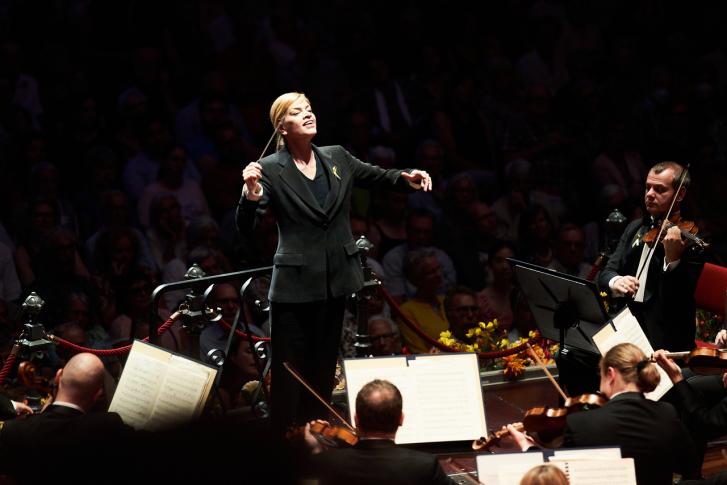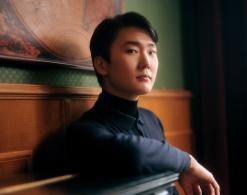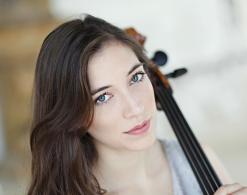Orchestra - the response to the attack [interview with Keri-Lynn Wilson]
It was created in a few months, and its tour included the largest concert halls in Europe and the USA. Ukrainian Freedom Orchestra is a phenomenon that testifies to the great power of music and Ukraine. Keri-Lynn Wilson - the conductor and originator of the project - tells in an interview about the origins and future of the orchestra.
Usually, conductors work with orchestras that have decades of experience and specific sound. The Ukrainian Freedom Orchestra was a different case.
The Ukrainian Freedom Orchestra was always going to be a singular project, not least in the construction of the orchestra. Every conductor and every orchestra is familiar with meeting each other as strangers for the first time and setting to work. But here the orchestra itself were often strangers to each other, members hailed from cities across Ukraine, as well as recent refugees and members of the Ukrainian musical diaspora across Europe. We were faced with a unique challenge, and also a unique opportunity of making something entirely new.
Is it hard to create a new orchestra from people who have played in so many different orchestras?
When we came together in the Teatr Wielki in Warsaw for the first time it was a wonderful moment and also a daunting one. I think we all acknowledge that our very first rehearsal contained a certain amount of rough edges. But it also contained the seeds of something very special and over the 10 days of rehearsal we had in Warsaw we engaged in the musical equivalent of a military Boot Camp. It was an extremely intense and extremely satisfying period. We started as a collection of individuals and by the end, we were transformed into an orchestra.
![Orkiestra, czyli odpowiedź na atak [rozmowa z Keri-Lynn Wilson]](/sites/default/files/styles/article_image/public/2022-10/179_tw-on_ufo_19-07-2022_easy-resize.com_.jpg?itok=fLPqlLUP)
How do musicians feel in such an orchestra? Is it more complicated for them to adjust?
Yes, of course it was more complicated for them, but don't underestimate the sheer professionalism of the musicians and their commitment to this project and to making a statement in support of Ukrainian culture. Everyone was willing to go the extra mile and soon enough any complications or unfamiliarity with each other were resolved and we were up and running as a coherent whole and working on the music together just like any other orchestra.
I wonder - how do musicians deal with emotions throughout such concerts? Not only the music is emotional but by playing it musicians fight for the culture of their country. I imagine that can be emotionally overwhelming.
There were profound emotions throughout this whole project. Many of the musicians had directly experienced the impact of the war or had family and friends who had. An emotional response was at the heart of what we were trying to do. But as I mentioned earlier, there was also a supreme sense of professionalism and the two things went hand-in-hand.
Leaving the subject of the Ukrainian Freedom Orchestra - how do musicians deal with emotions throughout concerts in general? Music sometimes can make listeners cry or shiver, musicians cannot allow themselves to express feelings like that while playing... or can they?
During a television interview I gave with two members of the orchestra we discussed the playing of Yuri Shevchenko's string version of the Ukrainian national anthem, which we performed as our encore throughout the tour. All three of us musicians found ourselves welling up as we recounted performing the piece in halls full of Ukrainian flags. The next thing I knew the television interviewer was welling up too and it has been the same story with audiences at every venue. The tears have flowed because the emotion is real and palpable, but so is the professionalism and skill and the power of our message. All these elements came together to produce something quite remarkable.
![Orkiestra, czyli odpowiedź na atak [rozmowa z Keri-Lynn Wilson]](/sites/default/files/styles/article_image/public/2022-10/unnamed-1.jpg?itok=JbTtIpOB)
You said that by performing you fight on the cultural front of the war. Do you really feel that you "fight" while playing or it's more about "expressing your emotions"?
I describe the orchestra as soldiers of music and emotion is an essential part of our armoury.
The other side of the war also has its "cultural front"? What is it like? What does Russia do (or try to do) on "a cultural front of war"?
Putin has explicitly said that he not only thinks Ukrainian land should be part of a Russian empire, but he thinks that Ukrainian culture is a part of a Russian empire. We reject this. Ukraine is a proud and independent nation with its own history and especially its own culture. Our very presence as an orchestra, playing great Ukrainian and other European music, is a powerful assertion that you cannot erase or silence a culture.
The European cultural channel ARTE has covered the event on its TV Channel and on its streaming platform ARTE.tv what else do you think the cultural community can give? What else do you need?
We've enjoyed amazing support from audiences and from the media wherever we have been. We were honoured that Arte chose to broadcast live our inaugural concert in Warsaw. Since then two more of our concerts have been broadcast on television, others on radio and it is probably not an exaggeration to say that no other orchestra tour in history has ever enjoyed such comprehensive media coverage. We are very grateful for the enthusiasm and interest with which both music and our message has been greeted.
![Orkiestra, czyli odpowiedź na atak [rozmowa z Keri-Lynn Wilson]](/sites/default/files/styles/article_image/public/2022-10/unnamed.jpg?itok=D3ZdK8E9)
For some - 5 months can seem like a long period of time, but I think that creating an orchestra in 5 months is a huge achievement, isn't it?
From first having the idea for an orchestra to its first public performance was almost exactly 5 months. The rehearsal period was just 10 days but before we met as an orchestra there was considerable preparation for what would be required both on and off the stage.
Can you tell the story of how the orchestra was created?
On the day Putin invaded Ukraine I was angry and appalled and immediately determined to do something to oppose this barbarism. Not just because I am of Ukrainian Canadian heritage, or because I have cousins who live in the country, some of whom are now fighting on the front line in Donbas. But because this assault on a country and its culture demanded a response in kind. I was in London with my husband Peter Gelb, who is General Manager of the Metropolitan Opera in New York, and we began to work out together what could be done. I could not take up arms but I could take up my baton as my weapon. So with the Met enabling the infrastructure of the tour, we set out to demonstrate the power of music in a time of war and to raise the morale of the Ukrainian artistic community and its embattled citizens.
And how do you recall playing a concert and rehearsing in Teatr Wielki – Polish National Opera in Warsaw?
If the idea for the orchestra came in London, and it was planned in New York, then the birth of the orchestra and its spiritual home was Warsaw. The Polish nation has been a generous host to many Ukrainians fleeing the war, including members of the orchestra, and it was through the efforts of the Polish National Opera and its visionary leader Waldemar Dabrowski that we came together there. Our repertoire included the great living Ukrainian composer Valentin Silvestrov, whose seventh symphony opened our concerts, and monuments to European culture and freedom by Brahms and Dvorak, Beethoven, and Verdi. But we also featured Chopin’s second piano concerto, played by the wonderful Ukrainian pianist Anna Fedorova. It was a tribute to Poland, and to Warsaw, and what they are doing for Ukraine and what they have done for us. That opening night was an electrifying experience for audience and musicians alike.
![Orkiestra, czyli odpowiedź na atak [rozmowa z Keri-Lynn Wilson]](/sites/default/files/styles/article_image/public/2022-10/unnamed-2.jpg?itok=AqD7-6A_)
I have a feeling that the orchestra was created unlike different bands not only for listeners but also for the musicians as well. To allow them to express what they want to say. Do you feel that way about this project?
Our primary objective was to serve the music and in so doing to honour Ukrainian culture. The musicians who did this displayed courage as well as skill and as I am honoured and proud to have been their leader, I know that they too have been honoured and proud to have contributed so much to this wonderful project.
What is the future of the Ukrainian Freedom Orchestra?
The Ukrainian Freedom Orchestra was intended to be a one-off response to Putin’s brutality. But during the course of the tour, it became clear to us all that the sheer weight of support we have enjoyed, and the talent and passion that the musicians have displayed, would mean ending the orchestra now would be a dereliction of our duty. We will therefore be announcing soon our plans for the Ukrainian Freedom Orchestra to reform and to play together again. And my deepest hope is that one day, and may that day not be too far away, the orchestra will not only grace halls in Poland, the UK, Germany, France, the United States, and elsewhere, but also in Ukraine itself and the orchestra will soon return home.





